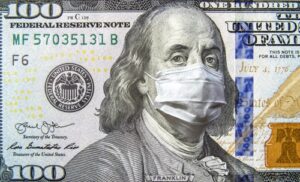Federal support, fewer restrictions
 The Federal COVID-19 Supplemental Appropriations package provides Nebraska $10.8 billion, plus another $1.6 billion in Economic Impact Payments. Last week, Governor Ricketts outlined the plan to distribute these funds under the Nebraska Coronavirus Relief Fund Program. Go here for those details beginning on page 14.
The Federal COVID-19 Supplemental Appropriations package provides Nebraska $10.8 billion, plus another $1.6 billion in Economic Impact Payments. Last week, Governor Ricketts outlined the plan to distribute these funds under the Nebraska Coronavirus Relief Fund Program. Go here for those details beginning on page 14.
Speaking of the Governor, he will cut his Monday – Friday 2 pm CDT press conferences to Mondays and Thursdays at 2 pm.
There’s more! The Governor announced the following less restrictive Directed Health Measures for 89 counties, effective tomorrow. The DHMs for Dakota, Hall, Hamilton, and Merrick Counties remain more stringent.
- Gatherings e.g., preschools, fairgrounds, fairs, festivals, auditoriums, stadiums, arenas, large event conference rooms, meeting halls, libraries, arenas, tracks, zoos, aquariums, swimming pools, etc. are restricted to the greater of 25 patrons (excluding staff) or 25% of the rated occupancy, not to exceed 3,000 people.
- Gatherings do not include airports, bus/train stations, shopping malls, offices, retail and grocery stores, etc.
- Gyms, health clubs, salons, barbershops, massage therapy, and tattoo parlors require masks and are limited to 25 patrons or 50% of rated capacity.
- Restaurants, bars, and private clubs cannot exceed 50% of the maximum rated occupancy. Patrons must be seated.
- Weddings and funeral receptions are limited to 25 attendees or 50% of the venue rated capacity.
- Religious services, weddings, and funerals must maintain six feet of separation and consist of a household unit or an individual.
- Baseball, softball, and volleyball may begin practices tomorrow. Games may start on June 18.
- Prohibited: parades, carnivals, dances, beer gardens, basketball, football, volleyball, and wrestling games and practices.
Select File
LB803 (Hughes) MONITOR – SPEAKER PRIORITY BILL
- Creates a new promotional checkoff program for pulse crops, including dry peas, lentils, chickpeas or garbanzo beans, faba beans, and lupine. The bill also expands a waiver of a distance limitation for overweight/oversize vehicles transporting crops to include pulse crops.
General File
LB1084 (Kolterman / MONITOR)
- The Nebraska Transformational Project Act would provide $300 million in state funding to the University of Nebraska Medical Center for their NExT Project. Before receiving $300 million, UNMC must show the economic impact to Nebraska is at least $2.7 billion during the planning and construction period and at least $4.9 billion over ten years.
- NExT Project has two components: a state of the art academic medical center facility and a federal all-hazard disaster response military and civilian partnership.
LB1159 (Stinner) SUPPORT
- Extends the initial training period for a noncertified pesticide applicator from 60 to 120 days prior to obtaining an initial commercial or noncommercial applicator license. The bill also authorizes unlimited exam attempts for the noncertified applicator during that training period.
Held In Committee
LB919 (Wayne / MONITOR)
- Hemp cultivator, processor-handler, and broker license and renewal applications shall only be denied if they are incomplete or deficient, including for nonpayment of the required application and registration fees, or if the applicant does not meet minimum qualifications.
LB946 (Briese / MONITOR)
- The bill lowers the sales tax rate and eliminates exemptions on services. Service includes all activities that are engaged in for other persons for a consideration and that involve predominantly the performance of a service as distinguished from selling or leasing tangible personal property.
Failed to Advance
LB974 (Linehan) MONITOR – REVENUE COMMITTEE PRIORITY BILL
- A complex property tax reduction and school funding bill. As amended by AM2433, the bill would reduce property taxes as a significant source of funding for K-12 education. Unless expressly exempt:
- Real property would be valued at 95% of actual value for the tax year 2020, 91% in the tax year 2021, and 86% in 2022 and after that.
- Agricultural and horticultural land would be valued at 65% of actual value in the tax year 2020, for purposes of taxes levied by a school district and 75% of actual value for taxes levied by other political subdivisions.
- Agricultural and horticultural land would be valued at 60% of actual value in the tax year 2021, for purposes of taxes levied by a school district and 75% of actual value for taxes levied by other political subdivisions.
- Agricultural and horticultural land would be valued at 55% of actual value in the tax year 2022, and each tax year after that, for purposes of taxes levied by a school district and 75% of actual value for taxes levied by other.
